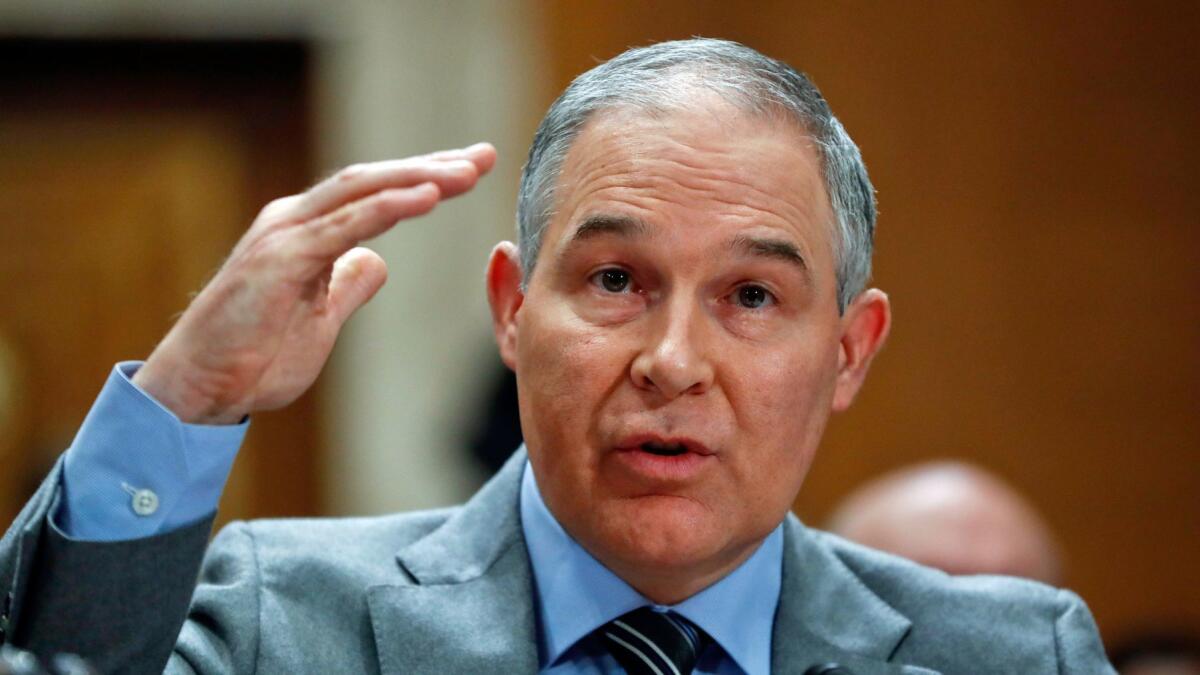Column: Trump’s effort to revoke California’s emission rules will be a disaster — for the auto industry

- Share via
The old adage about being sorry when you get what you asked for is about to land squarely on the head of the automobile industry.
Since even before the inauguration, automakers have been pushing Donald Trump to roll back federal fuel economy and auto emission standards and, not incidentally, to revoke California’s authority to set them for itself.
On Monday, they got their wish, at least partially. As my colleague Evan Halper reports, Environmental Protection Agency Administrator Scott Pruitt announced that he would roll back the federal goal of an average vehicular efficiency standard of more than 55 miles per gallon by 2025. The new, looser standard won’t be announced until later.
I’m not sure that in the long run it helps the industry to have the administration tossing grenades into the system.
— Stanford environmental law expert Deborah A. Sivas
At the same time, Pruitt implied that he’s prepared to revoke the waiver, implemented in 2010, allowing California to set its own efficiency standard. Since a dozen states have accepted California’s standards wholly or in part, California’s standards effectively govern as much as 35% of the nationwide auto market.
But revoking California’s waiver won’t be easy. California’s right to apply for a waiver was specifically and uniquely written into the Clean Air Act. The act requires the EPA to grant the waiver unless the state’s case is “arbitrary and capricious.”
The full waiver was finalized by the Obama administration after years of negotiations and study. “There’s a pretty meaty administrative record the Obama administration developed,” Deborah A. Sivas, an expert on this aspect of environmental law at Stanford, told me Monday. Moreover, she says, the Clean Air Act requires the EPA to defer to California.
“The burden is on the EPA administrator to show why the waiver should not be granted,” Sivas says. “He has an extra high burden in this case.”
In other words, Pruitt would have to develop his own record justifying revocation of the waiver. Any revocation would then be subject to litigation from California, other states and other plaintiffs that would be sure to stretch out for years.
“The big dilemma for the industry is what does this uncertainty do to your production planning process,” Sivas observes. “This doesn’t give you certainty as to what your targets are. I’m not sure that in the long run it helps the industry to have the administration tossing grenades into the system.”
The industry has been grousing for years about California’s standards, which under the waiver remain in place at least through 2025, with especially stringent rules beginning in 2022. Theoretically, the automakers could meet the fleet fuel efficiency standards by making their gas-fueled cars more efficient and by selling a larger percentage of hybrids and electric vehicles.
The manufacturers, however, maintain that they can’t meet the 2025 goal either way. They say electric cars and other zero-emission vehicles haven’t proven popular with the public. “We have the technology, but if sales aren’t there, we can’t meet the standards,” a spokeswoman for the Alliance of Automobile Manufacturers told The Times in January 2017.
These representations should be taken with a mound of salt. Industry always claims that it can’t meet government regulations, whether because they’re technologically impossible or will be disastrous for sales. Almost every time, these claims are shown to be exaggerated.
Automakers claimed for years that safety standards would harm them because consumers weren’t interested in safety; as it turned out, safety became a huge selling point for the auto industry, and still is today. The engineering and technological obstacles to meeting the fuel economy required by 2025 are likely to be far less important than the willingness of the auto companies to undertake the work.
Pruitt’s assertion Monday that his goal is to set “a national standard” for greenhouse gas emissions is just fatuous. The United States effectively has a national standard now — it’s the one set by California, which applies to a huge swath of the automobile market. If Pruitt really cared about coordination, he’d let well enough alone.
But he doesn’t care. His interest is in giving the auto industry what it wants, even if that means dirtier air for the rest of us and more wasteful use of our natural resources. The way to do that is to create chaos in environmental regulations, and in that endeavor Pruitt is as efficient as they come.
Keep up to date with Michael Hiltzik. Follow @hiltzikm on Twitter, see his Facebook page, or email michael.hiltzik@latimes.com.
Return to Michael Hiltzik’s blog.
More to Read
Inside the business of entertainment
The Wide Shot brings you news, analysis and insights on everything from streaming wars to production — and what it all means for the future.
You may occasionally receive promotional content from the Los Angeles Times.









